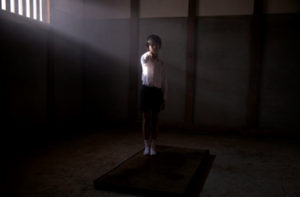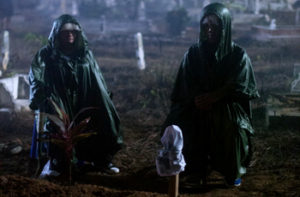
folk·lore
- a body of popular myth and beliefs relating to a particular place, activity, or group of people.“Hollywood folklore”
Folklore, like legends, are intriguing. Its stories oftentimes derive from an uncertain truth – uncertain, but some truth to its origins nonetheless. They are unlike myths where facets of their stories are untrue and said to have never existed. Folklore can be more pinpointed geographically where every nation, region, and even state may have folklore that has been passed on from generation to generation eventually taking a life of its own with different variations throughout time. I find this notion to be fascinating was always intrigued with American folklore so when I heard about the HBO Asia series, Folklore I was excited and very interested in checking out this anthology of shorts from Asian countries from South Korea, Japan, Indonesia, Thailand, Malaysia, and Singapore. I’ll be providing a brief synopsis for each installment in the series and a brief synopsis of what I thought about each episode.
 A Mother’s Love (Indonesia)
A Mother’s Love (Indonesia)
A single mother and her young son discover a group of dirty and underfed children living in a mansion’s attic. Upon saving them and returning them to their families, she has unknowingly snatched these children from their adopted mother – Wewe Gombel – and must now beware her vengeful wrath.
The folklore in this first episode revolves around the Wewe Gombel, a female supernatural entity who is said to kidnap unwanted or neglected children. According to the legend, “the ghost was named Wewe Gombel because it is related to an event that, according to ancient folklore, happened in Bukit Gombel, Semarang, where long ago a married couple lived. They had been married for years, but as time went by the husband realized that his wife was barren and stopped loving her. The husband became wayward, neglecting his wife and leaving her alone for long periods so that she lived in sorrow. One day she followed him and caught him in a sexual relationship with another woman. Hurt by her husband’s betrayal she became furious and killed him. Faced with the crime, angry neighbors gathered in a mob and chased her from the village. Despairing at the ostracization and continual harassment, she committed suicide.
After her death, her vengeful spirit became Wewe Gombel. Sundanese folklore says that she dwells in the crown of the Arenga pinnata palm, where she has her nest and keeps the children she catches. She does not harm them and once they are under her clutches they are not afraid of her.
Local traditions say that the children she abducts have been mistreated or neglected by their parents. She treats the children lovingly as a grandmother would, taking care of them and protecting them until their parents repent, at which point she returns them.” [1]

I had mixed feelings about this introductory episode in that I went into this series expecting to be scared out of my wits and instead I was surprised to be engulfed with a touching story of a dissolving relationship between a mother and her young son. There were scares strewn in throughout but the teetering relationship is what took precedence over the threat of the Wewe Gombel lingered in the background. The performances were strong in this one and the emotions of both mother and son, played by Marissa Anita and Muzakki Ramdhan, respectively, came across in a convincing fashion and with fervor. Again, while there were creepy moments strewn about, I would be hard-pressed to say that this was scary. Still, it was one of the stronger ones in this series.
***1/2 out of *****
 Tatami (Japan)
Tatami (Japan)
A murder scene writer returns home to attend his father’s funeral and begins to experience constant flashbacks of his childhood. He then discovers a secret door in the house that leads to a room that hides a horrifying secret from his family’s past.
“A tatami is a type of mat used as a flooring material in traditional Japanese-style rooms. Traditionally made using rice straw to form the core, the cores of contemporary tatami are sometimes composed of compressed wood chip boards or polystyrene foam.” [2]
The opening sequence of the episode explains the relationship of the Japanese and Tatamis and their relevance to one another throughout history. It is, according to this text, that the feelings and emotions that occur within the confines of the household are somehow recorded within the Tatami, engraining all sorts of emotion, whether they be happiness and bliss or grudges and anger. The story of the Zashiki-warashi, or “sitting room child”, a poltergeist-like spirit is prevalent in this tale. “These spirit-like beings are known for inhabiting usually larger, older houses or other buildings, but not always, and tend to settle within one of the storerooms, sitting rooms, or guest rooms of a location, almost always one fitted out with traditional Japanese woven tatami mats.” [3]
It is established early in this episode that our protagonist is a deaf-mute who is a journalist on a deadline writing a story about a family massacre. Instead of going home and finishing the story, he thinks it best to spend the night at the scene of the crime which does not appear to have been cleaned of the atrocities that unfolded on the said fateful night in question. Having spent the night there one would imagine that chaos would ensue and scares galore would abound. While there is an occurrence that kickstarts the eeriness of the episode it only serves to be a teaser for what is to come. Our protagonist wakes up the following morning with news of his father’s passing prompting him to go home to his mother where things are not what they seem. It is here where we see glimpses of his memories and it is clear that something went awry in his past.
While this may be somewhat of a slow burn, I rather enjoyed the mystery that was teased every so often, and I was intrigued to see it through to the end. We got, what I would consider, J-horror weirdness in this one that fascinated me to no end. I kept scratching my head and just couldn’t quite figure out what was happening until its climactic conclusion which, I would say, was rather satisfying. The acting was top-notch in this one, on par with A Mother’s Love, and I enjoyed the lore behind the Tatmi.
**** out of *****
 Nobody (Singapore)
Nobody (Singapore)
A Pontianak, the vengeful spirit of a woman who died during childbirth, is awakened when a foreman and a construction worker attempt to bury the body of a dead girl instead of burning her. A series of unfortunate events begin to occur at the construction site.
As described in the episode synopsis, this one deals with the Pontianak. A body is found in a construction site and for fear that this discovery will bring bad fortune to the future of the property, the financier of the project tasks his workers to get rid of the body and burn it. Plans do not go accordingly and the spirit of this dead girl, who was raped, impregnated, and eventually murdered, is released – she is the Pontianak. The Pontianak is a female vampiric ghost in Malay mythology. Pontianak are usually depicted as pale-skinned women with long black hair, red eyes, and white dresses smeared with blood, but they are said to be able to take on a beautiful human appearance since they prey on men and helpless people. They can also be beasts due to their bloodthirsty and carnivorous nature.
In folklore, a Pontianak usually arises at full moon and announces her presence through high-pitched baby cries. If the cry is soft, it means that the pontianak is near, and if it is loud, then she must be far. Some believe that if one hears a dog howling at night, that means the pontianak is far, but if a dog is whining, that means the pontianak is nearby. [4]
While this story is a creepy one, the execution of this episode was rather weak with poor acting to boot. The scares were little to none and despite the efforts of the director, scares fell short and were, for the most part, non-existent. Again, the story was good but the execution in the telling of this folklore was poor but it was not without effort. Many scenes dragged on longer than they should have as if they were trying to fill the runtime quota. I would skip this one and it is not on my list of rewatches anytime soon or maybe ever again.
**1/2 out of *****

Pob (Thailand)
A journalist meets with Pob, a Thai ghost, who confesses to a murder. Finally finding an outlet for complaint, Pob explains how the murder happened and requests for his story to be published. However, the journalist declines and the two make a deal of a lifetime.
The Pob (Phi-Pob) is a ghost that takes the form of a human body and is believed that it likes eating raw meat. This is pretty much the gist of this narrative but the encompassing story arc is that said POB in this short ishes his story to be told after having killed a person an American at that. This plays out much like An Interview with a Vampire gag whose intentions were to garner laughs rather than fright. There was an artistic decision to film most of this narrative in black and white to which I cannot explain why except to maybe hide some of the special effects. The story, while light in nature, barely packed a punch and I kept looking at my watch during the duration of this episode to see how much longer how much I would have to endure watching. I did not like this one at all: the acting was unforgivable, the comedy was weak and forced at times and you can forget about the scares because there were none. However, I might have chuckled once or twice. There is not much to say about this one. Skip it. (don’t let the image fool you)
* out of *****
 Toyol (Malaysia)
Toyol (Malaysia)
A Member of Parliament (MP) of a fishing town turns to a mysterious woman who possesses shamanistic powers to salvage his town’s dire economic situation. She fixes all his problems and the two soon become lovers. However, the woman has a dark secret that threatens to destroy his life.
Down on your luck? Nothing like a demon baby to give you that boost you need. A Toyol is a mythical creature from Malaysian folklore that is a dead baby that has been brought back to life by a Bomoh (a shaman) or somebody familiar with black magic. [5] This episode opens tragically. Given the nature of this folklore, you can only imagine what happens. I was conflicted with this entry as I enjoyed it for the most part but felt like there were a few instances where it felt slightly rushed and was not fleshed out completely. The acting was OK where some performances were much better than others with some inconsistencies from our protagonist (MP) and the punchline was rather good. There were a few moments of suspense and dread but nothing to lose sleep over. The special effects were little to be desired but once you get passed that, you should enjoy this one for its story.
*** out of *****
 Mongdal (Korea)
Mongdal (Korea)
A mother tries to appease the moods and demands of her borderline psychopathic son. When a new girl comes to town, her son falls quickly and deeply for the new girl and is determined to win her over possibly even against her will. When things take a tragic turn, his mother will stop at nothing to make her son happy even if it means finding a bride to join him in the afterlife.
The premise alone is a bit creepy, if not touching, to say the least. I mean come on, how sweet of a mother can one be to find a bride for her son in the afterlife?! Yeah, it’s creepy. A mongdal in an unmarried bachelor ghost. Sometimes there are shamanistic rituals that aim to unite both forms of ghosts, cheonyeo and chonggak gwishin, so that they may be married. If successful, their life is completed and satisfied (in a spiritual sense). At peace, they may then be permitted to heaven. In pop culture and films, the female ghost is much more common than the male version. [6] Dong-Joo is a disturbed kid who is infatuated in love with a girl in his class. All the kids think he is weird and even attribute the murder of another girl to him. Rumors and whispers abound, the kid’s reputation is in peril (more than it is already) and eventually, things go awry when his infatuation love turns her back on him. Have no fear because Dong-soo’s mother, who is the school’s principal (talk about awkward) swoops to the rescue and takes matters into her own hands trying to make right what was “wrong”.
Mongdal had great performances all around from its cast that was convincing, powerful, and strong. This entry was reminiscent of the first episode, A Mother’s Love, in that: A.) it featured a mother and son B.) they both had emotional moments that may bring some to tears (not I, of course), and C.) a satisfying and gripping story. Mongdal is one of the better entries in this first season of Folklore.
**** out of *****
Overall, I would say that Folklore, season one was a success despite its few misses. Still, I think they were well-made films that were able to share with the world, customs, and folklore that otherwise would be unknown to most of the Western civilization. It succeeded in that it made me want to look into these stories further and introduced a whole new world to me. Give it a watch and see for yourself.

[1] Wewe Gombel
[2] Tatami
[3] Zashiki-warashi
[4] Pontianak
[5] Toyol
[6] Mongdal
